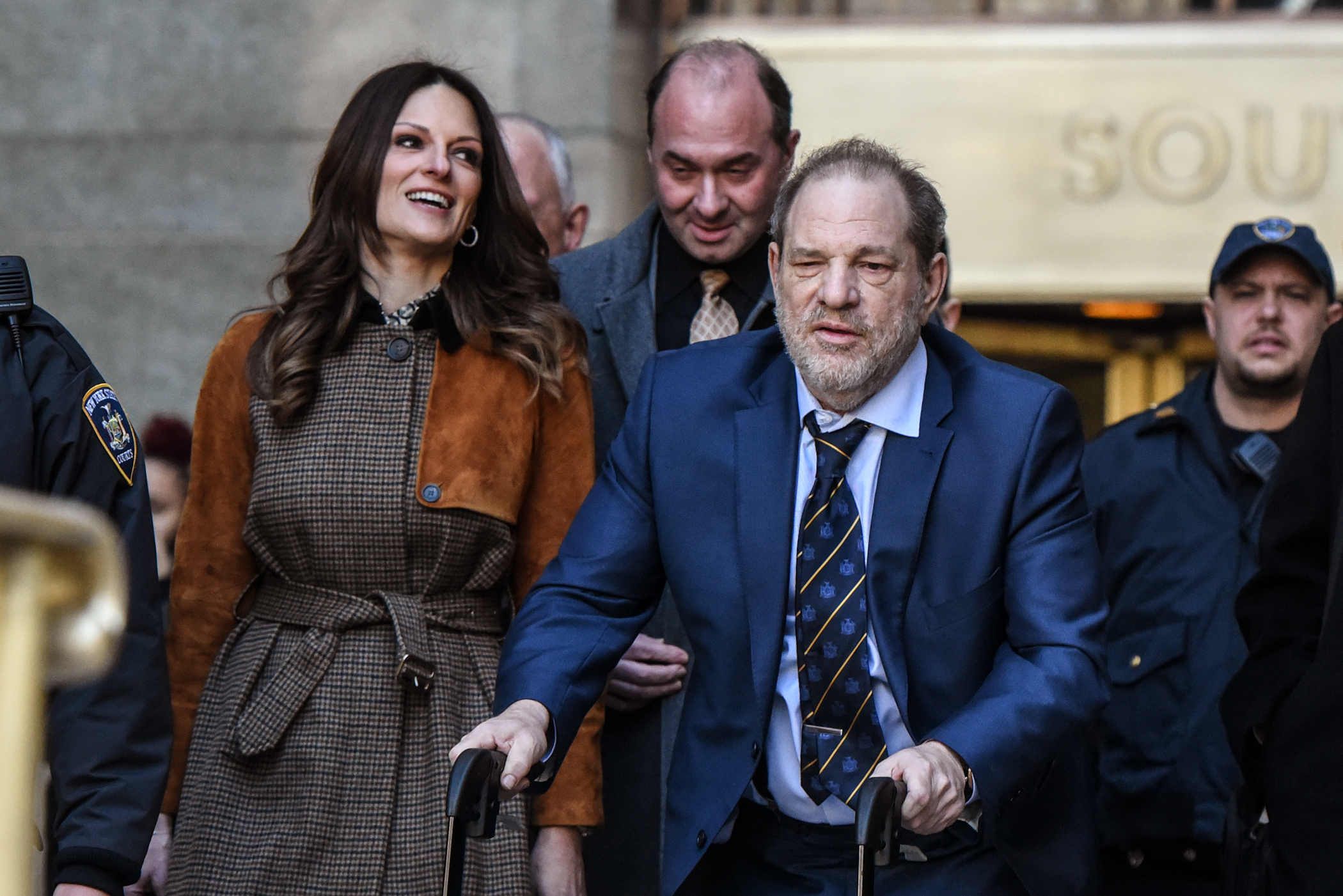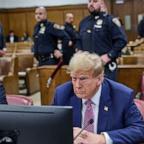Weinstein trial jurors ask for clarification of charges, blueprint of apartment
The jury asked for legal clarification of the charges and a blueprint.
Within the first hour of deliberations, the Weinstein jury sent a note to the judge, asking for legal clarification of the charges the movie mogul faces.
"We the jury request written legal definition of the charges being considered including forcible compulsion, consent, rape in the 1st and 3rd degree and criminal sexual act. We would also like an explanation of the law of why we may find the defendant guilty for predatory assault only and not other crimes. We would like the court to confirm whether we could find the defendant guilty of both counts 4 and 5, or whether we can just find him guilty of 3 or 4 or 5. We would like the court to confirm that we can only find the defendant guilty of count 1, only if the state has proven him guilty of both Mimi Haleyi and Annabella Sciorra and that we can only find him guilty of count 3," the note reads.
Some time later, the jurors then sent a second note asking for a blueprint of "the Soho apartment" which is in reference to Weinstein's former SoHo apartment on Crosby St. in Manhattan where Haleyi was allegedly sexually assaulted in 2006.
"We would like a copy of people’s exhibit #75 the blueprint of the Soho apartment. We would also like a copy of all the emails of certain women’s names are highlighted in red," the jury's note read.
After hearing from 35 witnesses over more than two weeks of testimony, the New York City jury in Harvey Weinstein’s rape and sexual assault case began deliberating Tuesday morning.
Day 1 deliberations ended without a verdict and resume tomorrow at 9:30 a.m.
Manhattan Supreme Court Judge James Burke has also ordered Weinstein's defense team not to speak with the press. His order follows an op-ed written by defense attorney Donna Rotunno which was published Friday by Newsweek.
"I implore the members of this jury to do what they know is right," Rotunno wrote in the op-ed.
"In that op-ed piece she actually implored the jury to acquit her client," Manhattan Assistant District Attorney Joan Illuzzi complained to Burke. "She’s actually speaking directly to the jury. It’s completely 100% inappropriate behavior," and said that the op-ed bordered on jury tampering.
"What were you thinking?," Burke asked Rotunno before imposing the gag order.
The incident followed a similar dustup a week ago when Rotunno appeared to lie to the judge about when a podcast interview she did with The New York Times' Meghan Twohey -- broadcast Feb. 7 on "The Daily" -- was recorded.
On the podcast, Rotunno was asked whether she herself had ever been sexually assaulted.
"No, I have not," she said, "because I would never put myself in that position."
That morning, Illuzzi complained to the judge about a different portion of that interview in which Rotunno was critical of the accusers, reminding Burke of his admonition at the start of the trial that the lawyers "leave the witnesses alone."
Rotunno insisted to the judge that the interview was "a long time ago" and that she had "not spoke to anyone since the start of this case," and had "no idea" when the segment would air.
But when BuzzFeed News checked her claims, a Times spokesperson verified that the interview was recorded Jan. 28, and that Rotunno was informed of the Feb. 7 air date.
Weinstein is facing five felony counts of rape and sexual assault, based on the testimony of two complaining witnesses: former “Project Runway” production assistant Miriam 'Mimi' Haleyi -- who claims the Hollywood producer sexually assaulted her in 2006, and an accuser who claims Weinstein raped her in a Manhattan hotel suite in 2013. ABC News is not naming the rape accuser because she has never publicly identified herself. The other five women either did so, or their lawyers gave ABC permission to name them.
The account of a third accuser, Annabella Sciorra, is too old to prosecute, but a judge allowed her to testify in support of two predatory sexual assault charges -- which require prosecutors to prove that Weinstein attacked at least three women.
In order to convict on either of the two predatory sexual assault charges, the jury must believe either Sciorra and Haleyi’s accounts, or Sciorra and the rape accuser’s account.
Three additional women -- Dawn Dunning, Tarale Wulff and Lauren Young testified as "prior bad acts" witnesses to demonstrate the prosecution’s contention that Weinstein engaged in a pattern of predatory behavior -- essentially seeking sexual favors in return for providing career opportunities.
Prosecutors portrayed the accusers in opening arguments as unsuspecting women who sought out professional opportunities but got more than they bargained for.
Manhattan Assistant District Attorney Meghan Hast's opening arguments spotlighted some of the extraordinary challenges prosecutors face in seeking to convict Weinstein for crimes that took place years ago and include no physical or forensic evidence.

Hast outlined the accounts of numerous witnesses allegedly overpowered by Weinstein who -- nervous, upset and confused -- sometimes gave up the physical struggle against him and simply stopped resisting. In some instances, the accusers returned to Weinstein time and time again, despite emotionally and physically devastating alleged sexual assaults.
Both complaining witnesses maintained contact with Weinstein after their alleged assaults, and defense attorneys portrayed all of Weinstein’s six accusers at trial as ambitious women navigating a ruthlessly competitive industry, who "relabeled" consensual sexual encounters as assaults once allegations about Weinstein were published in the fall of 2017 in The New York Times and The New Yorker.
"We're not victim-shaming," defense attorney Damon Cheronis said in opening arguments. "'Victim is a conclusion attained only after trial. These are complaining witnesses."
"What you are going to see throughout this trial is that they wanted to have it both ways," Cheronis said. "You can't say, 'I'm afraid of this man, I can't get away from him,' and then reach out to him to see if he'll be in L.A. for your birthday."
Prosecutors contended that the accusers were "tricked" into being alone with Weinstein, and then suddenly sexually assaulted.
Of scores of women who have publicly accused Weinstein of sexual assault or misconduct, only six were subject to public testimony and the withering cross-examinations that followed.
Prosecuting attorney Illuzzi underscored their commitment in closing arguments.
"They didn't come for a beauty contest. They didn't come for money. They didn't come for fame. They came to be heard."
"They sacrificed their dignity, their privacy and their peace for the prospect of having that voice, and their voices would be enough for justice," she said.
If you or someone you know experienced sexual assault and is seeking resources, call the National Sexual Assault Hotline at 1-800-656-HOPE (4673).
This report was featured in the Tuesday, Feb. 18, 2020, episode of “Start Here,” ABC News’ daily news podcast.
"Start Here" offers a straightforward look at the day's top stories in 20 minutes. Listen for free every weekday on Apple Podcasts, Google Podcasts, Spotify, the ABC News app or wherever you get your podcasts.




